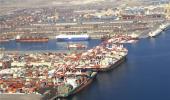External Affairs Minister S Jaishankar said the Chabahar port would benefit the entire region and a narrow view should not be taken of it, after the United States warned that any country having business dealings with Iran runs the 'potential risk of sanctions'.

Speaking at a programme in Kolkata on Tuesday night, he said that in the past, even the US has been appreciative of the fact that the Chabahar port has a larger relevance.
India on Monday signed a 10-year contract to operate the strategic Iranian port of Chabahar that will help New Delhi expand trade with Central Asia.
"We had a long association with the Chabahar port but we could never sign a long-term agreement. The reason was there were various problems... Finally, we were able to sort this out and we were able to get the long-term agreement done. A long-term agreement is necessary because without it we cannot improve the port operations. And, the port operations, we believe, will benefit the entire region," Jaishankar said.
"I did see some remarks which were made, but I think it's a question of communicating and convincing and getting people to understand that this is actually for everybody's benefit. I don't think people should take a narrow view of it. And, they have not done so in the past.
"If you look at even the US's own attitude to Chabahar in the past, the US has been appreciative of the fact that Chabahar has a larger relevance. We will work at it," he said.
Located in Sistan-Balochistan province on the energy-rich Iran's southern coast, the Chabahar port on the Gulf of Oman -- which New Delhi had proposed to develop way back in 2003 -- will provide Indian goods a gateway to reach landlocked Afghanistan and Central Asia using a road and rail project called International North-South Transport Corridor (INSTC), bypassing Pakistan.
US sanctions on Iran over its suspected nuclear programme had slowed the development of the port.
"We're aware of these reports that Iran and India have signed a deal concerning the Chabahar port. I will let the government of India speak to its own foreign policy goals vis-a-vis the Chabahar port as well as its bilateral relationship with Iran," US State Department Deputy Spokesperson Vedant Patel told reporters at his daily news conference on Monday.
"I will just say, as it relates to the United States, US sanctions on Iran remain in place and we'll continue to enforce them," he said in response to a question on the Chabahar port deal.
"You've heard us say this in several instances, that any entity, anyone considering business deals with Iran, they need to be aware of the potential risk that they are opening themselves up to and the potential risk of sanctions," Patel said.
India and Iran have projected the port as a key hub for the 7,200-km-long INSTC -- a multi-mode transport project for moving freight among India, Iran, Afghanistan, Armenia, Azerbaijan, Russia, Central Asia and Europe.
The long-term agreement was signed by Indian Ports Global Limited (IPGL) and the Port and Maritime Organisation of Iran, an official statement said.










